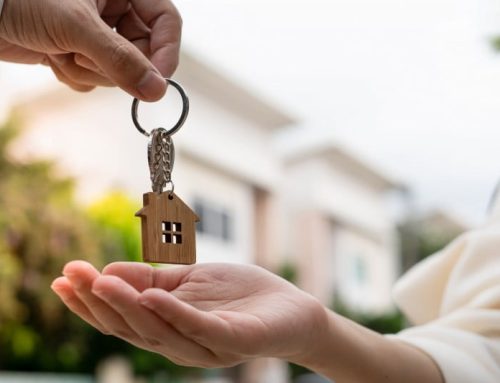It’s no secret that mortgage rates have been rising for some time now. If you’re shopping for a home in the Charlotte area, you might be wondering if now is really the right time to buy a house and take out a mortgage. “Have I missed my chance? Am I making the right decision?”
No one can say what the future will bring. Mortgage questions are normal. But there’s another way to look at the situation: mortgage rates are temporary, but your dream home is forever. That’s what we mean when we say “date the rate, marry the house.”
Let us explain.
Mortgage rates rise and fall in cycles
Currently, we are in a rising interest rate environment. While that can be good for your savings account (finally!), it’s been tough for borrowers.
Average mortgage rates hit record lows in the wake of the pandemic, dropping to just 2.68% in December 2020. But as the recovery got underway, rates crept up and up and up. By September 2022, the average 30-year fixed mortgage rate was 6.11%, according to Freddie Mac. And there are no signs of this rise slowing down.
Why are rates going up, when they’ve been at historic lows for a few years? In a word, inflation.
The global pandemic shook up economies across the world, and America was no exception. As our country’s central bank, the Federal Reserve (or “the Fed”) is trying to get rampant inflation under control, and one of its sharpest tools is controlling interest rates. So the Fed hikes interest rates, people slow down their purchasing and borrowing, and the economy (at least in theory), gets back on stable footing.
But the downside is that if you want to bid on that Davidson townhouse, Fort Mill single-family home, or Charlotte condo this year, your mortgage will cost more than it would have two or three years ago.
Home values tend to appreciate over time
But here’s the other side of that coin: home values tend to appreciate over time. Specifically, home prices in North Carolina have been marching in a consistently upward trend since 2010, according to the Federal Reserve Bank of St. Louis.
That’s no guarantee they will continue rising in the future—but judging from data over the past 40 years, it’s pretty clear that the general trend is up. Would you rather buy at the bottom of that chart, or the top? If home prices continue to rise, it makes more sense to purchase now, and let your investment appreciate.
But that brings us back to the mortgage rate question. Should you buy a home when rates are rising?
You have many mortgage options
For starters, it’s important to know that a traditional 30-year fixed-rate mortgage is not your only choice. There are a wide variety of mortgage products that might better suit your needs, and have lower rates, too.
For instance, in mid-October 2022, the average 30-year fixed mortgage had a rate of 6.92%. But if you change the mortgage terms to a 15-year fixed, the average rate drops to 6.09%.
Want to get that rate even lower? Take a look at ARMs—adjustable-rate mortgages. With an ARM, your rate resets periodically. That can work to your advantage. Research from Freddie Mac shows that in October 2022, the average rate for a 5/1-year ARM was 5.82%, over a full percentage point less than a 30-year fixed.
Using our residential Mortgage Calculator you can see the effect those average rates can have on the interest you’ll pay on your mortgage.
For example, suppose you have a $300,000 home loan, and you’re choosing between a 30-year and a 15-year at these average rates:
- 30-year fixed at 6.92%: You’ll pay $412,733.50 in interest over 30 years, for a total payment (principal plus interest) of $712,733.50.
- 15-year fixed at 6.09%: You’ll pay $158,312.53 in interest over 15 years, for a total payment (principal plus interest) of $458,312.53.
Although the rate on the 15-year is only 0.83 percentage points lower, you’d pay $254,420.97 less over the course of that mortgage— 36% less—for the same home. That’s a powerful difference.
Try our mortgage calculator for yourself to see the different options available, including calculations for PMI, closing costs, and more. You’ll see that the rate is not the only number that matters when it comes to your mortgage.
Refinancing is a powerful tool
And there’s another factor to consider. When you “date the rate,” nothing is forever—except your forever home. You have the ability to change the rate later, when things are more favorable, through mortgage refinancing. That’s what we mean when we say “date the rate, marry the home.” Your home stays, but the rate can change with a refi.
Because the economy runs in cycles, what goes up eventually comes back down again. Consider homebuyers of the 1970s and 1980s. Home purchase prices were lower—but mortgage rates were much higher. In 1981, for example, the average interest rate on a 30-year fixed mortgage was 16.63%! But they didn’t stay there, and buyers who waited until rates came down missed out on years of home appreciation (not to mention birthdays, holidays, and special memories in their new home).
Once inflation gets under control again, and the economy cools down, we could see a return to lower interest rates. That’s the perfect time to refinance.
Say you have your eye on a $300,000 home in Charlotte. It has all the space you need, a beautiful yard, and a gorgeous kitchen. You could choose a 30-year fixed rate mortgage, even though it has a higher interest rate, simply because you feel more comfortable with the monthly payments under that arrangement.
In a few years, when interest rates drop, you can refinance that gorgeous home with an attractive mortgage that takes advantage of the equity you’ve built and taps into a better rate. You’d be saving money—without giving up years of life in your dream home.
Houses are for living
Let’s face it, the economy is out of our control. We can’t change the macroeconomic climate; all we can do is the best we can with the circumstances we are in.
If you think life is too short to wait around for “someday” (as in, “someday” the rates will fall, “someday” we’ll time it exactly right), then you understand why it’s better to date the rate but marry the home. Lock down the home you love, create the memories that life is built on, and trust that you can refinance when the economy tilts in your favor again.








